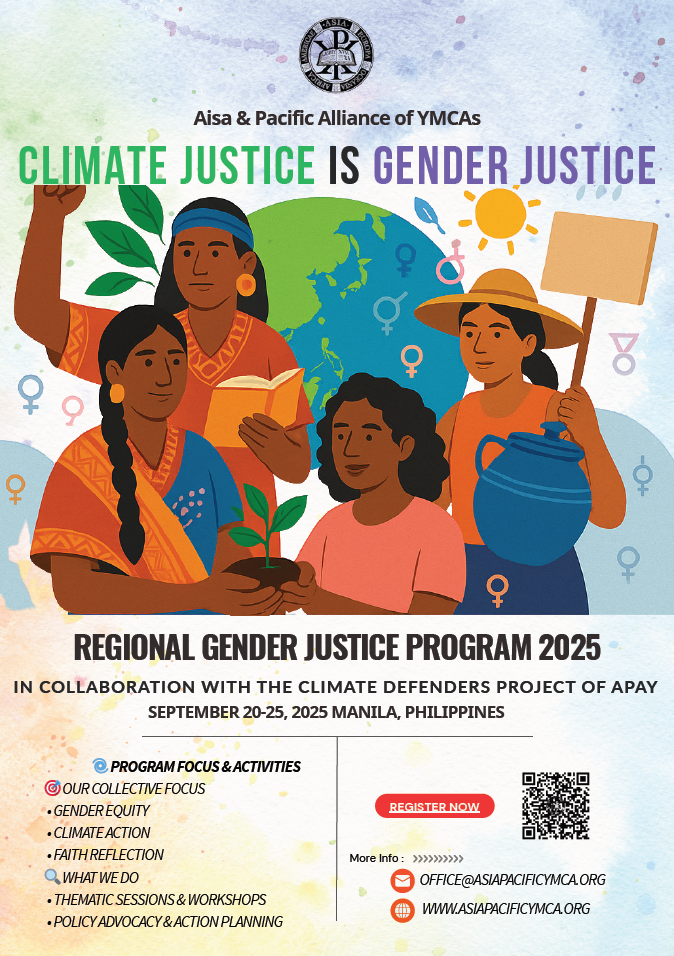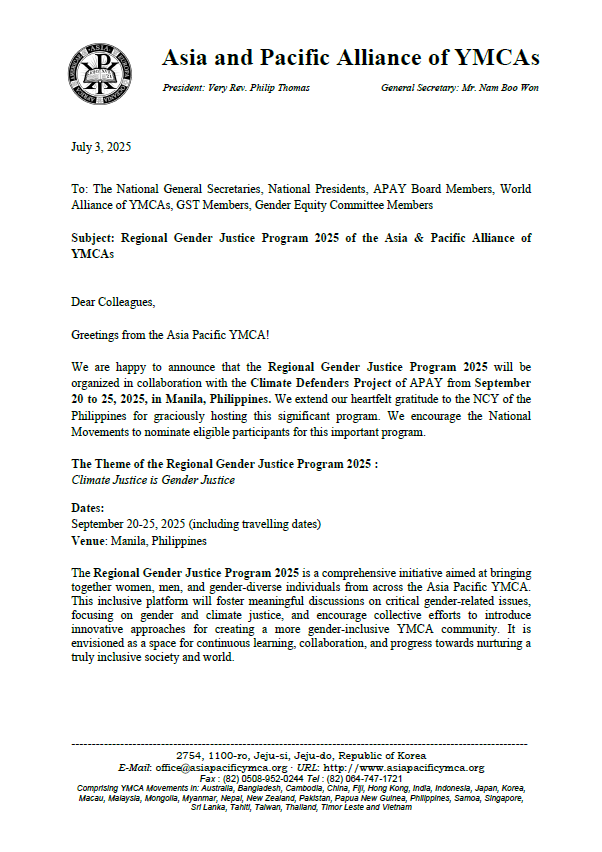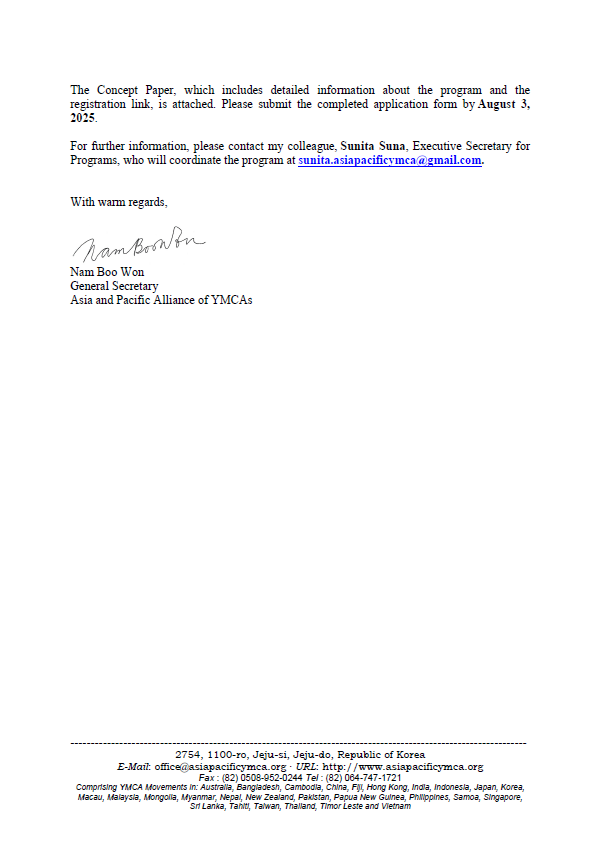Regional Gender Justice Program 2025
Last Updated (Thursday, 17 July 2025 15:14)


Regional Gender Justice Program in Collaboration with the Climate Defenders Project of APAY
September 20-25, 2025
Manila, Philippines
Theme: Climate Justice is Gender Justice

Participants of the Gender Equity Forum 2023, Chennai, India
Asia and Pacific Alliance of YMCAs
Hong Kong Office
23 Waterloo Road, 6th Floor, Kowloon, Hong Kong SAR
Tel. 852-27808347, 2770 3168, 2783 3058
Jeju Office
2754, 1100-ro, Jeju-do
Republic of Korea
Tel: +82-064-747-1721
e-mail: This e-mail address is being protected from spambots. You need JavaScript enabled to view it
www.asiapacificymca.org
REGISTRATION & PREPARATIONS
- A. Participants of the Program
- Members/ volunteers of YMCAs who are interested in exploring gender and climate justice
- The members of the Gender Equity Committee and the members/staff in charge of gender-related programs and activities in their YMCAs.
After the regional gender justice program, there will be follow-up activities at local and national YMCAs. The participants of the regional gender justice program must be actively involved in coordinating, participating in the program.
- B. Fees
Registration Fee: US$100 (Mandatory)
Green Fee: US$15 (Mandatory for participants who travel by air)
The Fees can be sent to the following bank account, or participants may bring them to the Philippines.
Bank Details of APAY Foundation in Korea
Bank Name: Kookmin Bank
Account holder: Asia Pacific YMCA
Account number: 873868-11-015529
Swift Code: CZNBKRSE
Bank Address: 50, Yeonbuk-ro, Jeju-si, Jeju-do, Republic of Korea (Zip: 63085)
(Tel: +82-2-2073-7114)
- C. VISA
The ASEAN countries and the Northeast Asian countries do not require a visa to enter the Philippines. With recent development, Indian citizens can also enter the country without a visa for a 14-day tourism purpose. (Please reconfirm with the Philippines Embassy in your country.) Bangladesh, Pakistan, and Sri Lanka citizens must apply for a visa before arrival. Please make sure to provide the necessary information in the registration to prepare your visa documents.
D. Airfare
The sending YMCA is responsible for the return travel from the home YMCA—Manila—home YMCA and any other domestic travel-related expenses in the home country or Manila that may be incurred before or after the duration of the program.
- E. Insurance
Sending YMCAs must provide Travel and Personal Accident Insurance coverage for their participants. Please ensure that the insurance covers overseas travel, medical and personal accidents.
- F. Subsidies
APAY subsidies are limited; hence, eligible participants from national movements with financial difficulties are provided partial or complete airfare subsidies based on the case. Applicants meeting the criteria should submit a written application endorsed by the National General Secretary. Successful candidates will be notified accordingly.
- G. Other Information about the Program
Worship & Biblical Reflection
Christian Foundation is the core of the pillars of the APAY Quadrennial Program Plans. Hence, developing faith perspectives of our activities is essential to make them meaningful. The sessions will begin daily with a 15-minute worship and biblical reflection led by the participants and facilitators.
Moderator of the Day
Each day, a designated participant will lead the session by introducing the resource person or facilitators, summarizing the previous day's lessons, expressing gratitude at the end of the day, ensuring smooth session flow with proper time management, and taking the lead in organizing activities when necessary.
Documentation
Assist in documentation by gathering photos and videos and collating daily proceedings. Responsible for recording all session details and other directed documentation tasks.
Certificate
Successful participants will be awarded a Certificate of Attendance.
- H. Registration
Before registering, please prepare the following documents for upload:
- Signed endorsement letter from your National General Secretary on the letterhead for participating in the regional gender justice program. Download the sample letter here
- Signed Subsidy Form from your National General Secretary. Download the APAY Subsidy Form here
Google Registration Form: Click here to register and submit.
Deadline to submit registration August 3, 2025
Concept Paper
Background and Rationale
The journey towards gender equality is pivotal in achieving development goals. A significant milestone in this journey was the 2015 designation of gender equality as the fifth goal among the 17 Sustainable Development Goals (SDGs) outlined in Agenda 2030. This designation, encapsulated in SDG 5, aims to eradicate discrimination against women and girls, ensuring equal opportunities and rights for a harmonious, prosperous, and sustainable life.
For several decades, the Asia Pacific region has pursued gender equality and gender justice. Within its Quadrennial Program Plan, the region has designated a specific program area called the ‘Gender Justice Program.’ To effectively implement gender justice initiatives, the region has established a Gender Equity Committee. The Gender Equity Committee fosters an inclusive environment through education, awareness-building, and policies that promote and reflect gender justice.
Introduction and Overview of YMCA’s Mission and Values
The Challenge 21 of YMCA affirms that "YMCA is a worldwide Christian, ecumenical, voluntary movement for women and men with special emphasis on each member YMCA to focus on:
- Empowering all, especially young people and women, to take increased responsibilities, assume leadership at all levels, and work towards an equitable society.
- Advocating for and promoting the rights of women and upholding the rights of children (Excerpts from Challenge 21)
Climate Justice is Gender Justice
The theme "Climate Justice is Gender Justice" underscores the vital and inseparable connection between environmental sustainability and gender equality. Climate change is not gender-neutral—women, girls, and gender-diverse individuals, particularly in marginalized communities, are disproportionately affected by its impacts due to entrenched social, economic, and political inequalities.
These disparities manifest in many ways: increased vulnerability to natural disasters, food and water insecurity, limited access to resources, and exclusion from decision-making spaces. Yet, despite these challenges, women and gender-diverse people are not merely victims of climate change—they are powerful agents of change. Across the globe, they are leading grassroots movements, innovating sustainable practices, and advocating for environmental justice and community resilience.
Recognizing and amplifying their roles is not only a matter of equity but a strategic imperative for effective and lasting climate solutions. This theme calls for inclusive, intersectional approaches to climate policy and action—approaches that dismantle systemic barriers and ensure that climate responses are equitable, participatory, and empowering for all genders.
By advancing gender justice, we strengthen our collective ability to confront the climate crisis and build a more just, resilient, and sustainable future for everyone.
Regional Gender Justice Program 2025
The Regional Gender Justice Program 2025 is a collaboration with the Climate Defenders Project of the APAY. This dynamic platform will drive impactful discussions on critical issues of gender and climate justice. We are committed to galvanizing collective efforts that ensure climate responses are not only equitable and participatory but also empower individuals of all genders to take action and make a difference.
Objectives
- Foster Safe Spaces: Create inclusive platforms within YMCAs for open dialogue on gender equity.
- Raise Awareness: Highlight the gendered impacts of climate change and the leadership of women and gender-diverse individuals.
- Theological Reflections: Integrate Biblical and theological insights to explore gender and climate justice.
- Engage Communities: Collaborate with gender-diverse and indigenous groups to deepen understanding and inclusivity, and facilitate cross-sector dialogue and partnerships for collective action.
- Advocate Policy Change: Promote gender-responsive climate policies and programs.
- Build Capacity: Strengthen community-driven, inclusive climate resilience efforts.
- Develop Action Plans: Generate actionable outcomes from program discussions.
- Celebrate Diversity: Nurture networks and honor the diversity within the YMCA community.
Program Activities & Processes
- Thematic Sessions & Panel Discussions: Featuring climate activists, gender experts, and policymakers.
- Workshops: On gender mainstreaming in climate adaptation and mitigation strategies.
- Storytelling Campaigns: Sharing lived experiences and local solutions from women and gender-diverse individuals.
- Faith Reflections: Understand Christian faith from the gender and climate justice perspectives
- Community Immersion Program: hands-on experience to learn the realities of the community’s experiences about gender and climate justice
- Policy Roundtables: Engaging government and civil society to co-create inclusive climate policies.
- Action Plan: Develop action plans to implement the collective recommendations and follow-up actions at the local, national and regional levels.
Conclusion
Achieving climate justice requires more than technological solutions demands social transformation. By centering gender equity in climate action, we not only address the root causes of vulnerability but also unlock the full potential of communities to lead resilient, sustainable change. "Climate Justice is Gender Justice" is not just a theme—it is a call to action.
For further details, please contact
Ms. Sunita Suna, Executive Secretary for Programmes
Asia and Pacific Alliance of YMCAs
This e-mail address is being protected from spambots. You need JavaScript enabled to view it






